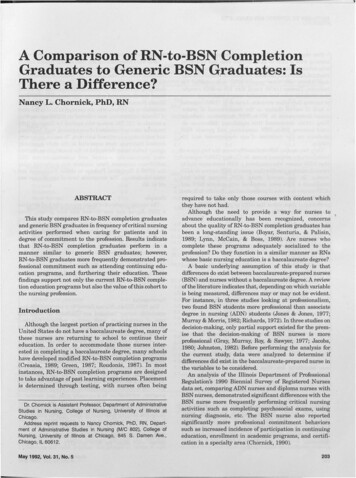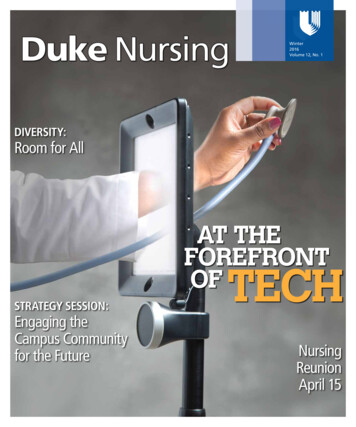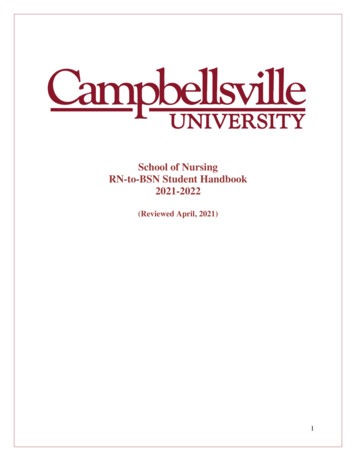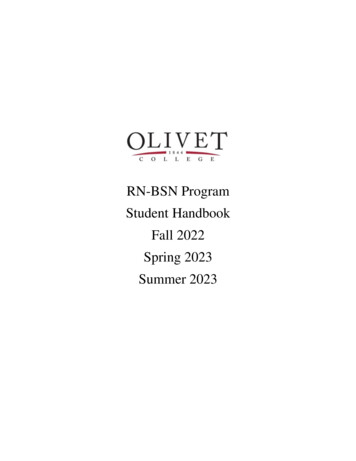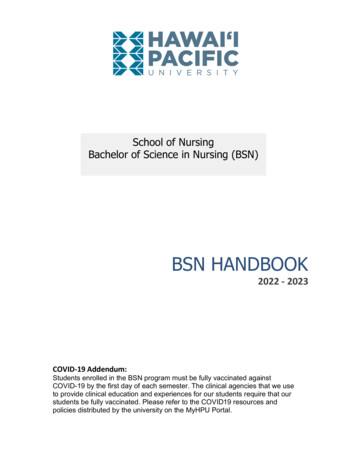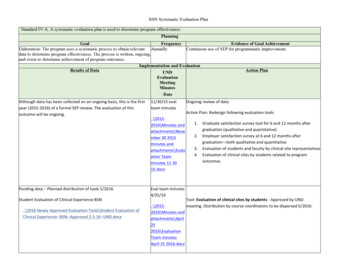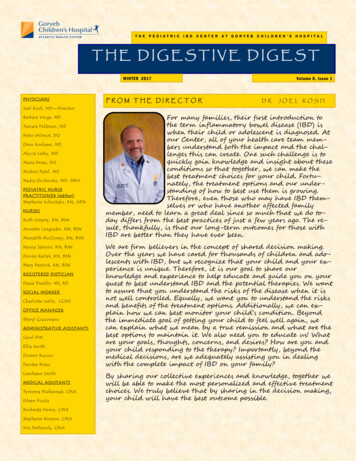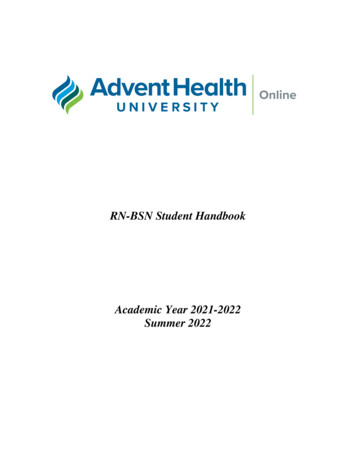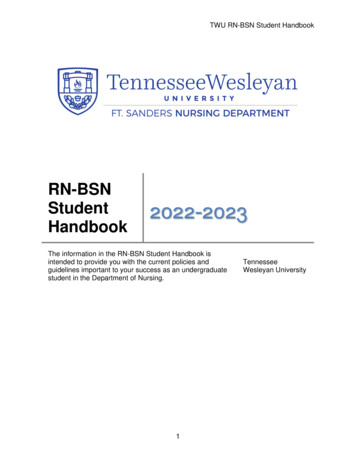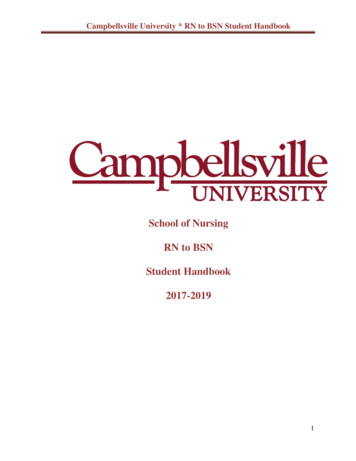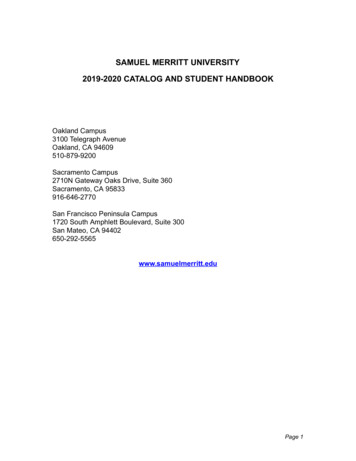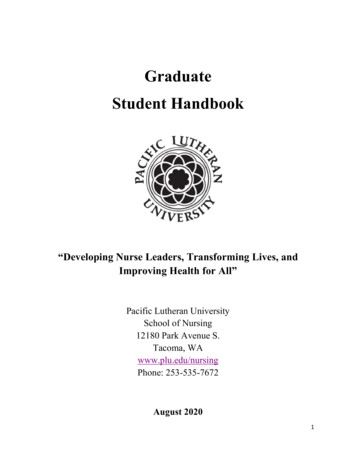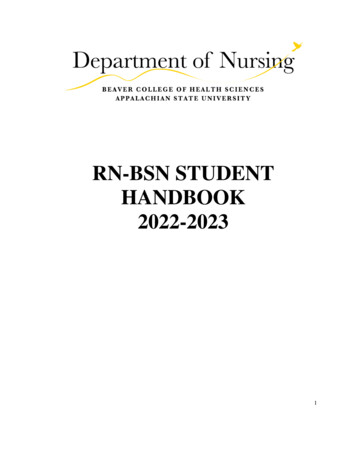
Transcription
RN-BSN STUDENTHANDBOOK2022-20231
Physical LocationDepartment of Nursing, 5th FloorLeon Levine Hall of the Beaver College of Health Sciences1179 State Farm Road Boone, NC 28608-2151Simulation LabsLeon Levine Hall of the Beaver College of Health Sciences, 3rd Floor1179 State Farm Road Boone, NC 28608-2151Mailing Address /Contact InformationAPP STATE PO Box32151 Boone, NC28608-2151Phone: (828) 262-8039Fax: (828)262-8066App State Online400 University Hall Drive, 2nd FloorAPP STATE Box 32054Boone, NC 28608-2151Phone: 828-262-3113Toll-Free: 800-355-4084Fax: 828-265-8673online@appstate.edu2
Table of ContentsNursing DepartmentNursing Department Directory .7Vision, Mission and Goals .8Philosophy.9Program Outcomes.10Crosswalk of Major Concepts and Professional Nursing Roles .11Level Objectives .12Nursing Department Organizational Structure .13General InformationStudent Advisement .13Student Input into Quality Program Improvement .13Currency of Student Status and Contact Information .13Academic Affairs Policies .14Academic Integrity.14Plagiarism .14APP STATE Student Support Services .15Additional Resources .16Financial Aid .18Formal Complaints.19Unfair Treatment .19Student Misconduct .19Admission, Progression, Graduation, Dismissal and ReadmissionAdmission Criteria .20Transfer Credit .20Progression Requirements .20Incomplete Courses .21Withdrawals .21Refund Policy.22Graduation Requirements .22Dismissal Policy.24Readmission Policy.25CurriculumCurriculum Overview .26RN-BSN Course Descriptions .27Computer Policy .29Email Policy .293
Classroom PoliciesRemediation .29Grading PoliciesGrading Scale .31Grading Disputes and Resolutions .31Final Grade Appeal .31Clinical Policies and RequirementsClinical Hours . 32Professional Behavior .32Just Culture Framework .32Verification of CPR, OSHA, and HIPAA Training .32Health, Immunization, and Safety PoliciesHealth and Immunization Requirements.32Physical Exam/Health Status .32N-95 Fit Testing .33Immunizations.33TB Screening.35Safety and Technical Standards Policy and Procedure .36Safety and Technical Standards Requirements .38Criminal Background Check and Drug ScreeningPolicy .40APP STATE Guidelines for Assessing Crimes/Misconduct in Relation to Nursing Requirementsand Activities .42Consent and Release Authorization Policy .46Universal ConfidentialityPolicy .46Social MediaPolicy .49Accident and InjuryPolicy .51Event Reporting in the Clinical SettingEvent Reporting Policy .53CeremoniesNursing Department Graduation Ceremony .544
University Graduation .54FormsAccident and Injury Event Report .56Blanket Release for Use of Photograph .58Clinical Event Report .59Consent and Release Authorization .61Drug Screening and Criminal Background Check Acknowledgement and Agreement .62Physical Examination.63Remediation: Academic .64Remediation: Clinical .65Safety and Technical Standards: Evaluation .66Student Handbook Agreement .68Student Information .69Tuberculosis Risk Assessment .70Tuberculosis Testing Record: Annual.71Tuberculosis Testing Record: Initial .72Universal Confidentiality Agreement .735
FORWARDWelcome to the Appalachian State University Department of Nursing. This handbook contains themost essential and commonly used policies of the University, as well as specific nursing program policies.Please note that the Handbook is subject to change as the program grows and policies are refined.As you begin your nursing education at Appalachian State University, remember that you are thenursing leaders of tomorrow. Take pride in Appalachian State University and in the education that is shapingyou to be an outstanding professional nurse.Appalachian State University’s Department of Nursing supports the mission of the University and theBeaver College of Health Sciences which includes excellence in teaching/learning and the fostering ofscholarship and service to community. The complete text of these statements is included in the AppalachianState University Undergraduate Bulletin, 2022- 2023. The Department of Nursing does not discriminate onthe basis of race, national origin, gender, religion, or disability.6
NameNURSING DEPARTMENT DIRECTORYOfficeOffice PhoneNumberADMINISTRATIONRayman, Kathleen PhD.Department ChairBernard, Jean,PhD. Undergraduate Program DirectorHaley, TammyPhD. Graduate Program DirectorWittmann, Kelly AdministrativeSupport SpecialistWittmann, Lee Clinical LearningLabs & Simulation Tech SupportTurpin, Rebecca PhD, AssociateProfessor/ Dir. of Compliance & StudentSupportColeman, Mary, MSNRN to BSN CoordinatorFACULTYAlmond, RebekahMSN Clinical FacultyBogardus, MelindaPhD, Assistant ProfessorBrackney, DanaPhD. Associate ProfessorHicks, WhitneyMSN Clinical FacultyKoontz, AngelaMSN Clinical FacultySusan LanePhD. Associate ProfessorLiljestrand, Rebecca,MSN Clinical FacultyMartin, SarahMSN Clinical FacultyMarler, GregoryDNP, ACNP-BC, Assistant ProfessorMorgan, KristenMSN,Clinical FacultyRudisill, MicheleDNP, DNP, MHAClinical FacultyVenrick, HeatherDNP, FNP-C Clinical FacultyWelborn, AmberPhD. Assistant h@appstate.edu7
APP STATE Department of NursingVISION STATEMENT, MISSION, GOALS, PHILOSOPHY,AND EXPECTED OUTCOMESVISION STATEMENT:Appalachian State University Department of Nursing will provide evidence-based nursingeducation in an intellectually stimulating and challenging environment that is designed toprepare the professional nurse with the knowledge and skills needed to practice in diversesettings in a highly complex health care system.MISSION:The mission of the Department of Nursing at Appalachian State University is to advance ourstudents’ cultural, intellectual, and personal development in order to prepare them forprofessional practice as registered nurses in entry level and advanced roles. This mission isachieved through the efforts of faculty committed to excellence in teaching, scholarship, andservice. A broad, in-depth curriculum is provided built on the study of arts, humanities,mathematics, natural and social sciences, and standards for professional nursing practice.Graduates serve their community by applying research and principles of education in theirpractice of nursing in the entry level and advanced roles.GOALS:The goals of the RN-BSN program are to:1. Provide a quality program in nursing based on a liberal education and professional nursingvalues, competencies, and knowledge.2. Facilitate the development and implementation of professional nursing roles in caring forindividuals, families, groups, and communities from diverse geographical and culturalbackgrounds through the application of knowledge, theory, and research from nursing aswell as other related disciplines.3. Instill in students an appreciation for and commitment to lifelong learning, scholarship, andservice in order to promote their personal growth, advance the profession of nursing, andmeet the health needs of society.4. Prepare nurses who can practice as generalists in any health care setting.5. Provide a foundation for graduate nursing education.Approved 8/2018; Reviewed 07/2021
PHILOSOPHY:NursingNursing is a practice discipline that provides a vital and distinctive service to globalsociety through utilization of principles from nursing, physical, biological, and socialsciences, arts, humanities and mathematics to assist individuals, families, groups,communities and populations achieve an optimal level of health. The focus is on holistichealth through evidence-based practice and patient centered care. Professional nursingcare is predicated on effective communication and critical thinking skills, currentknowledge for evidence-based practice (EBP), technical and assessment skills, the nursingprocess, and a code of professional ethics.Nurses are vital members of the collaborative healthcare team and practice in multiple anddiverse environments, to promote optimal healthy functioning of persons.PersonEach person is a holistic being who embodies inherent dignity and worth, and the right toself-determination. The focus of nursing care is persons as individual, family, groups,communities and/or populations. There is a synergistic relationship among person,nursing, health, and environmentHealthHealth is defined by the perception of each person. Health is viewed holistically andincludes the way persons interact with their environment.EnvironmentEnvironment provides the context for human life, internal and external. The combinedinfluences of the external and internal environments determine the growth anddevelopment of persons and their state of health.Nursing EducationNursing education encompasses scholarly inquiry and evidence-based practice to prepareprofessionals to enhance well-being and healthcare outcomes for individuals, families,groups, communities and/or populations.While the faculty is committed to appreciating each student’s uniqueness andaccommodating each student’s learning needs, the faculty expects students to beresponsible for their own learning and to engage with the faculty in a dynamic, interactive,educational process. Nursing Education is a mutual endeavor in which students andfaculty share, pursue, and generate knowledge in a collaborative setting.Approved 4/2016; Reviewed 07/20219
PROGRAM OUTCOMES:The following educational outcomes are based on the mission, goals, and philosophy ofAppalachian State University’s Department of Nursing.The program graduate will:1. Provide holistic nursing care to individuals, families, groups, communities, andpopulations across the lifespan based on professional nursing standards.2. Engage in evidence-based practice through the utilization of critical thinking skills andstate-of-the art knowledge for persons with varying health promotion, health maintenance,and health restoration across the lifespan.3. Demonstrate accountability for formal and informal experiences that promote bothpersonal and professional growth and lifelong learning.4. Employ competent communication skills (listening, verbal, nonverbal, written andelectronic) with individuals, families, groups, communities, and populations as well asmembers of the interprofessional healthcare team facilitating a culture of quality andsafety.5. Competently utilize technology and health information resources for self, colleagues,individuals, families, groups, and communities.6. Exhibits leadership skills such as coordinating, collaborating, delegating, and supervisingnursing care provided by others.7. Collaborate with individuals, groups, communities, and populations through mutualgoal setting, advocacy, and education to promote health and wellness.8. Exhibit a patient centered approach that reflects the professional values of altruism,autonomy, human dignity, integrity, and social justice.9. Adhere to economic, ethical, legal, and professional nursing standards in nursing practice.10. Appraise the continuum of care and resource utilization based on the liberal artsfoundation and nursing knowledge.Mission, Goals, and Outcomes: Adopted 4/2007 Philosophy: Adopted 4/2007 Revised: 10/2008 Revised: 2/2009Revised 1/2013; Reviewed 1/2014; Revised 4/2016; Reviewed 7/2021.10
Crosswalk of Major Concepts and Professional Nursing RolesConceptProvidingNursing ProfessionalDesigning, Managing,and CoordinatingHolistic Nursing Care Nursing ProcessTheory-based Practice Theory-based PracticeTechnical essional ical issuesCaringCaringLegal/ethical issuesCultural CompetenceTeaching/learningTheory-based PracticePatient-centered CareEvidence-basedPractice and Clinical JudgmentHealth tCultural CompetencemanagementInterprofessional andDiversity(access, evaluate,intra-professionalInter- andand care teammemberIntra-professionalcommunicationCritical ThinkingInquiryInquiryEBP/researchGoal SettingEBP/researchClinical judgmentClinical JudgmentPrioritizingEvaluating outcomesGoal settingInterpretive reasoning Evaluating outcomesApplication ofApplication ofknowledgeknowledgePrioritizing ityEmpowermentEBP/researchProfessional identitySafety/qualityProfessionalismProfessional valuesAutonomyHealth PolicyGlobal perspectiveEvaluating OutcomesSupervisionLife-long learnerAccountabilityLegal/ethical issuesLegal/ethical issuesEmpowermentHealth Care Systems11
Level Objectives 3000Level Objectives 40001. Demonstrates skill in providing holistic nursingcare to individuals and families across the lifespanbased on professional nursing standards.1. Provides competent holistic nursing care toindividuals, families, groups, communities, andpopulations across the lifespan based on professionalnursing standards.2. Select evidence-based practice approachesthrough the utilization of critical thinking skillsand state-of-the-art knowledge for persons withvarying health promotion, health maintenance andhealth restoration needs across the lifespan.2. Evaluate and utilize evidence-based practice throughthe utilization of critical thinking skills, and state-of-theart knowledge for persons with varying healthpromotion, health maintenance, health restoration, needsacross the lifespan,3. Explore the attributes and the role of theprofessional nurse.3. Participate in formal and informal experiences thatpromote both personal and professional growth.4. Demonstrates effective communication (listening,verbal, non-verbal, written, and electronic) skillswith individuals, families and groups as well asmembers of the interprofessional healthcare teamfacilitating a culture of quality and safety4. Employs competent communication anddevelopmentally appropriate skills in effectivecommunication skills (listening, verbal, non-verbal,written, and electronic) with individuals, families,groups, communities, and populations as well asmembers of the interprofessional healthcare teamfacilitating a culture of quality and safety.5. Identify health information resources for self,individuals, families, and colleagues.5. Utilize technology and evaluate and disseminatehealth information resources for self, colleagues, andindividuals, families, groups and communities.6. Coordinates and collaborates with thehealthcare team in the provision of care.6. Demonstrates leadership skills in coordinating,collaborating, delegating, and supervising nursing careprovided by others7. Collaborates with individuals, families andgroups through mutual goal-setting and educationto promote health and wellness.7. Collaborates with individuals, families, groups,communities, and populations through mutual goalsetting, advocacy, and education to promote health andwellness.8. Participates in a patient centered (individual andfamily) approach that reflects professional valuesof altruism, autonomy, human dignity, integrityand social justice.8. Displays a patient-centered approach (individual,family, groups, community, and populations) thatreflects the professional values of altruism, autonomy,human dignity, integrity and social justice.9. Follow procedures for economic, ethical, legaland professional nursing standards in nursingpractice.9. Demonstrates skill in economic ethical, legal, andprofessional nursing standards in nursing practice.10. Applies a liberal arts education to theunderstanding of the continuum of care andresource utilization.10. Evaluate the continuum of care and resourceutilization based on the liberal arts foundation andnursing knowledge.Approved 4/2016; Reviewed 7/202112
NURSING DEPARTMENT ORGANIZATION STRUCTUREThe Department Nursing is comprised of the Chair, Program Director(s), Tenure TrackFaculty, Clinical Faculty, Adjunct Faculty and Administrative Staff. Unless otherwisenoted in a specific policy, students are encouraged to address their concerns (when theyarise) to their assigned course/clinical faculty member and subsequently to the RN-BSNCoordinator, then program director, and finally to the department chair if not resolved.STUDENT ADVISEMENTAcademic advisement is provided by the Beaver College of Health Sciences Office ofAdvising and Academic Support located on the first floor of the Leon Levine Hall ofHealth Sciences 1179 State Farm Road, Boone NC. Ms. Larke Blanton is the currentAPP STATE Nursing Department Advisor, Room: 101, Phone: 828-262-8877, email:blantonla@appstate.edu. For any concern or issue, students are encouraged to contact theRN to BSN Coordinator, Ms. Mary Coleman remotely at phone: 828-262-8054, email:colemanma1@appstate.edu OR the Undergraduate Program Director, Dr. Jean Bernard,Room 512B Leon Levine Hall, 828-262-8468, bernardjs@appstate.edu.STUDENT INPUT INTO QUALITY PROGRAM IMPROVEMENTThe Department of Nursing invites students to provide input for quality programimprovement through completion of faculty and course evaluations, participation in focusgroups, and through representation on the Curriculum and Student Affairs committees.STUDENT INFORMATIONThroughout the nursing program, students are required to convey current information to thedepartment regarding contact information (changes in name, address and phone number), family emergency illness, or injury course drops, additions, or withdrawals from one or more classesStudents must notify the RN-BSN Coordinator, Program Director, Chair of theDepartment of Nursing, Beaver College of Health Sciences Nursing Advisor andRegistrar’s Office of intent to drop, add, or withdraw from one or more classes.At the beginning of each academic year, students must complete the Student InformationForm and sign a Student Handbook Agreement that documents receipt and review ofthe Department of Nursing Student Handbook.Upon admission to the program, students must give consent and sign the BlanketRelease For Use of Photograph Form. Forms are all completed in the compliancesystem.Revised 5/2017; 5/2018; 7/2019; 7/202113
APP STATE ACADEMIC AFFAIRS & POLICIESStudents must comply with all Appalachian State University policies including: Disability Resources Attendance Student Engagement in Coursework Academic IntegrityExamples of academic integrity violations include:o Cheatingo Fabrication & falsificationo Multiple submissiono Plagiarismo Abuse of academic materialso Complicity in academic dishonesty Specific policies and requirements for infection reporting & prevention (COVID-19 or other)Policies may be found at: https://studentconduct.appstate.edu/ labi-policy-and-statement-information https://policy.appstate.edu/Academic Integrity Code https://www.appstate.edu/go/coronavirus/Academic IntegrityFormal complaints related to academic dishonesty are addressed in the Appalachian StateUniversity: Academic Integrity Code 2022-2023.Violations of the Academic Integrity Code are addressed on a case by case basis by the Office ofStudent Conduct.PlagiarismPlagiarism is defined in the Appalachian State University Academic Integrity Code as “presentingthe words or ideas of another as one’s own work or ideas”. All directly quoted material must beproperly cited. Plagiarism includes but is not limited to borrowing, downloading, cutting,pasting and paraphrasing without acknowledgement, including from online sources, or allowinga person’s academic work to be submitted as another’s work.Approved 5/11/2017; Revised 7.15.19; Revised 6/30/202014
APP STATE Student SUPPORT SERVICESLibrary Services (828-262-2186): Students are encouraged to use the APP STATE’s libraryfacilities. John Wiswell is the Health Sciences Librarian and can be reached at 828-262-7853or wiswellj@appstate.edu.Counseling Center (828-262-3180), http://counseling.appstate.edu/: APP STATE’sCounseling Center is available to students at any time. For emergencies, on weekends andevenings, students may contact APP STATE’s Police at (828)262-2150 if counseling staffmember is needed. In addition, the counseling center may refer students to local mental healthservices.Student Health Services (828-262-3100), https://healthservices.appstate.edu: APP STATE’sBSN (Prelicensure) students have access to Student Health Services, however online nursingstudents do not pay the student health services fee and are not eligible.Disability Resources (828-262-3056), https://odr.appstate.edu/: Appalachian State University iscommitted to making reasonable accommodations for individuals with documented qualifyingdisabilities in accordance with the Americans with Disabilities Act of 1990, and Section 504 of theRehabilitation Act of 1973. Students must go to the Student Process webpage at:https://odr.appstate.edu/students to make an electronic Student Accommodation Request aspart of the process for determining accommodations. For temporary accommodations, please seethis request documentation form for temporary impairments.pdf.Students seeking accommodations based on a substantially limiting disability must contact andregister with The Office of Disability Resources (ODR). ODR engages in an interactive process toreview requests for accommodations with consideration of course requirements and a student’scondition, history, and request. Once registration is complete, a student will meet with ODR staff todiscuss eligibility and appropriate accommodations. ODR will contact and inform course faculty ofneeded accommodations. Faculty are very willing to assist students based on ODR’srecommendations.Inclusive Excellence (828-262-2144), https://titleix.appstate.edu/getting-help: APP STATE iscommitted to Inclusive Excellence and does not position diversity as simply the presence ofdifference, but instead treats diversity as the intentional inclusion of the cultures, worldviews,gifts, talents, history, and traditions of all people and places. Inclusive Excellence employs a broaddefinition of diversity that includes: (Dis)ability Religion Gender identity Social class Gender expression Sexual orienta
RN to BSN Coordinator Remote Office 828 -262 8054 colemanma1@appstate.edu FACULTY Almond, Rebekah MSN Clinical Faculty 512D 828-262-8091 almondre@appstate.edu Bogardus, Melinda PhD, Assistant Professor 511 828 -262 8087 bogardusma@appstate.edu Brackney, Dana PhD. Associate Professor 520 828-262-8028 brackneyde@appstate.edu Hicks, Whitney
